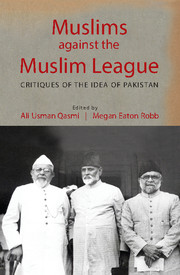Book contents
- Frontmatter
- Contents
- Acknowledgements
- Introduction
- 1 Maulana Husain Ahmad Madani and the Jami'at ‘Ulama-i- Hind: Against Pakistan, against the Muslim League
- 2 The Partition Conundrum: Perspectives, Experiences and Ambiguities from qasbahs in India
- 3 Choudhary Rahmat Ali and his Political Imagination: Pak Plan and the Continent of Dinia
- 4 Differentiating between Pakistan and Napak-istan: Maulana Abul Ala Maududi's Critique of the Muslim League and Muhammad Ali Jinnah
- 5 Advising the Army of Allah: Ashraf Ali Thanawi's Critique of the Muslim League
- 6 The Illusory Promise of Freedom: Mian Iftikhar-ud-Din and the Movement for Pakistan
- 7 Visionary of Another Politics: Inayatullah Khan ‘al-Mashriqi’ and Pakistan
- 8 Nonviolence, Pukhtunwali and Decolonization: Abdul Ghaffar Khan and the Khuda'i Khidmatgar Politics of Friendship
- 9 Islam, Communism and the Search for a Fiction
- 10 Muslim Nationalist or Nationalist Muslim? Allah Bakhsh Soomro and Muslim Politics in 1930s and 1940s Sindh
- 11 Dancing with the Enemy: Sikander Hayat Khan, Jinnah and the Vexed Question of ‘Pakistan’ in a Punjabi Unionist Context
- 12 Religion between Region and Nation: Rezaul Karim, Bengal, and Muslim Politics at the End of Empire
- 13 ‘The Pakistan that is going to be Sunnistan’: Indian Shi'a Responses to the Pakistan Movement
- 14 The Baluch Qaum of Kalat State: Challenging the Ideological and Territorial Boundaries of Pakistan
- Contributors
- Index
6 - The Illusory Promise of Freedom: Mian Iftikhar-ud-Din and the Movement for Pakistan
Published online by Cambridge University Press: 28 February 2018
- Frontmatter
- Contents
- Acknowledgements
- Introduction
- 1 Maulana Husain Ahmad Madani and the Jami'at ‘Ulama-i- Hind: Against Pakistan, against the Muslim League
- 2 The Partition Conundrum: Perspectives, Experiences and Ambiguities from qasbahs in India
- 3 Choudhary Rahmat Ali and his Political Imagination: Pak Plan and the Continent of Dinia
- 4 Differentiating between Pakistan and Napak-istan: Maulana Abul Ala Maududi's Critique of the Muslim League and Muhammad Ali Jinnah
- 5 Advising the Army of Allah: Ashraf Ali Thanawi's Critique of the Muslim League
- 6 The Illusory Promise of Freedom: Mian Iftikhar-ud-Din and the Movement for Pakistan
- 7 Visionary of Another Politics: Inayatullah Khan ‘al-Mashriqi’ and Pakistan
- 8 Nonviolence, Pukhtunwali and Decolonization: Abdul Ghaffar Khan and the Khuda'i Khidmatgar Politics of Friendship
- 9 Islam, Communism and the Search for a Fiction
- 10 Muslim Nationalist or Nationalist Muslim? Allah Bakhsh Soomro and Muslim Politics in 1930s and 1940s Sindh
- 11 Dancing with the Enemy: Sikander Hayat Khan, Jinnah and the Vexed Question of ‘Pakistan’ in a Punjabi Unionist Context
- 12 Religion between Region and Nation: Rezaul Karim, Bengal, and Muslim Politics at the End of Empire
- 13 ‘The Pakistan that is going to be Sunnistan’: Indian Shi'a Responses to the Pakistan Movement
- 14 The Baluch Qaum of Kalat State: Challenging the Ideological and Territorial Boundaries of Pakistan
- Contributors
- Index
Summary
Veteran politician, inveterate rebel, self-styled defender of progressive values; Mian Iftikhar-ud-Din remains one of the most intriguing individuals to have been associated with the Pakistan movement and the Muslim League. As an outspoken advocate of Muslim self-determination and Pakistan, the inclusion of Mian Iftikhar-ud-Din in this volume might seem like an odd choice indeed. And yet, his political journey reveals much about the tense political climate of the 1940s and the impossible choices that many were confronted with at the time. More importantly, though, his politics also provides an insight into the varied dreams and aspirations that were tied to the idea of Pakistan. In doing so, Mian Iftikhar-ud-Din's political trajectory also contributes to a deeper understanding of relatively neglected aspects of the Pakistan movement and the early years of the nascent post-colonial state when many of those utopian dreams turned sour.
Early political career
In the archival record, Mian Muhammad Iftikhar-ud-Din first emerges as a politician of note in 1936, when he joined the Indian National Congress. Aside from the most rudimentary details, not much is known about his earlier life. Born in 1907 into an affluent family in Baghbanpura, Lahore, Iftikhar-ud- Din obtained his primary and secondary education at the city's elite Aitchison College. He later obtained his higher education at Balliol College, Oxford. Not much is known about his political leanings or affiliations during his time at Oxford or his preoccupations after he returned to India in the early 1930s. After his entry into politics, Mian Iftikhar-ud-Din, like others belonging to his illustrious background, rose to occupy the highest ranks of the provincial Congress Party. He contested the 1937 elections on the Congress ticket and was duly elected as a member of the Punjab Legislative Assembly. In 1940 he was elected as the president of the Punjab Provincial Congress, a position he held until 1945. During this period, like other Congress leaders, he too was interned for civil disobedience and for participating in the Quit India Movement.
That Iftikhar-ud-Din was a prominent voice in the provincial Congress party provides some clues into the contours of the nationalist movement in Punjab. As in other provinces, the Congress, especially in the 1920s and 1930s, was a broad church of groups with varied political leanings. Unlike other major provinces though, the Congress party in the Punjab was a relatively weak political force.
- Type
- Chapter
- Information
- Muslims against the Muslim LeagueCritiques of the Idea of Pakistan, pp. 169 - 189Publisher: Cambridge University PressPrint publication year: 2017

